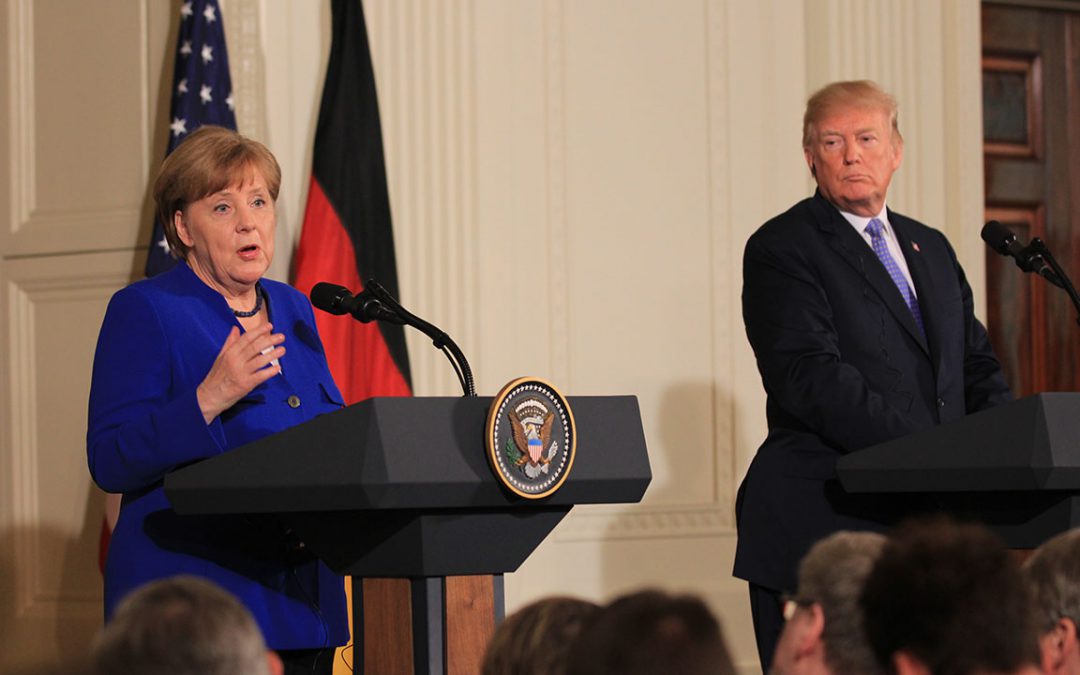WASHINGTON – With the North Atlantic Treaty Organization’s annual summit next month quickly approaching, some NATO experts say that President Donald Trump’s recent, precedent-shattering foreign policy decisions could have both short and long-term repercussions, including decreasing the effectiveness of the July 12 Brussels gathering and the unintended bolstering of Russia’s global agenda.
“When the union strength of NATO is undermined, the first one that feels the sense of victory is President [Vladimir] Putin and Moscow,” Mark Simakovsky of the Atlantic Council explained in an interview. “The Russians have sought for years for ways to split up the alliance to showcase the United States as an untrustworthy ally.”
Putin’s most recent testing of NATO’s resolve involves Russia’s stepped-up military activity in Ukraine. Amid NATO infighting, Russia could benefit from a fractured alliance that he’s managed to distract, says Simakovsky.
NATO, which was created to solidify transatlantic relations between North America and Europe after WWII to protect North Atlantic countries from the Soviet Union, has endured trying moments in its history when alliance members disagreed on important global affairs. But according to experts like Simakovsky, who served as a Pentagon official in President Barack Obama’s administration, Trump’s recent foreign policy moves are unprecedented and could tarnish the United States’ international reputation as a reliable leader in global affairs.
Trump’s recent decision to officially pull the U.S. out of the multi-lateral Iran nuclear deal caused a wave of frustration among NATO members and European allies who saw the U.S. as a central player in keeping Iran’s nuclear program from further development. German Chancellor Angela Merkel and French President Emmanuel Macron, leaders of two of the U.S.’s closest allies, have said they are concerned with how re-imposed U.S. sanctions on Iran will affect business deals for European companies who interact with Iranian companies.
Trump’s May 31 announcement to impose aluminum and steel tariffs on European allies is the most recent risk to a cohesive NATO alliance. The decision to place a 25 percent tariff on steel and 10 percent tariff on aluminum came after months of intimidation by U.S. Treasury Secretary Steve Mnuchin, who threatened to tie an exemption from trade tariffs on NATO and European partners – which includes Germany and France – to only those countries that meet NATO’s defense spending target of 2 percent of GDP. The most recent data show that the United States, the United Kingdom and Greece are the only ones of the 29 NATO countries who met the quota in 2017.
According to Dan Hamilton of the Center for Transatlantic Relations at Johns Hopkins University in Washington, this trade-off approach “shakes confidence and trust and viability of NATO.”
“You pay me and I’ll protect you; if you don’t pay enough maybe I won’t protect you,” Hamilton explained. “That’s not exactly the basis of a strong alliance. I think it rattles a lot of allies who are looking to the U.S. for protection.”
This bargaining strategy could further exacerbate resistance to working with the United States on building an alternative to the Iran deal, and will leave allies hesitant to meet that 2 percent defense spending goal, Simakovsky warned. Merkel and Macron still feel burned by the United States pulling out of the Iran deal, and, as a result, might approach the summit resisting Trump’s demands, foreign policy experts cautioned.
Simakovsky acknowledged NATO’s nearly seven decades of resilience, and argued that previous U.S. administrations have also disagreed with the NATO majority’s prevailing views of the moment. But Trump’s dedication to an “America First” agenda in particular has created an isolation between the United States and its allies that has been unseen previously, Simakovsky explained.
“There’s some real questions about whether some members in the NATO alliance continue to view their interests as aligning with the United States and that inevitably will bleed into the discussions about NATO’s future and NATO’s strength,” said Simakovsky. “If allies like France and Germany, which are critical pillars in the NATO alliance believe that the United States is making decisions that are contrary to their interests and contrary to the interests of European security, then there will be a belief that the United States maybe isn’t the critical pillar in the NATO alliance.”
Trump met at the White House on May 17 with NATO Secretary General Jens Stoltenberg to discuss the agenda for the upcoming summit. During a joint press briefing with the general, the president remained adamant that member countries must up their spending on defense. The United States spent over 3.5 percent of its GDP on national security measures last year, far outpacing the other 28 alliance members.
Stoltenberg, who said there is “more need for the alliance now than ever,” emphasized a three-year trend of all NATO countries steadily increasing their defense spending.
“That’s important,” Stoltenberg said. “Because we live in a more unpredictable world, and we need to invest in our security.”
Stoltenberg nodded to Trump’s pressure on alliance members to increase their defense outlays, saying the president helped to convince countries that they needed to contribute more to their armed forces.
At the meeting with Stoltenberg in the Oval Office, Trump repeated his frequently-expressed view that the U.S. “has been ripped off for many years” and that countries that continue falling below the 2 percent line “will be dealt with.” The president did not elaborate.
Expectations for next month’s summit, therefore, are limited. Close diplomatic observers warn it’s not likely that European countries affected by Trump’s diplomatic decisions will suddenly agree to the American administration’s demands.
As Simakovsky added, “The devil is in the details.”
Published in conjunction with


